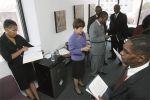ATLANTA (AP)—The city that became a post-civil rights movement emblem of the political power held by African-Americans could have a White mayor for the first time in a generation—a possibility that has some in the Black community scrambling to hold on to City Hall.
Atlanta Councilwoman Mary Norwood, who is White, is one of the front-runners for the Nov. 3 election, along with City Council President Lisa Borders and state Sen. Kasim Reed, both of whom are Black.
All three have bristled at a racially charged e-mail circulated by a Black leadership group calling for Norwood’s defeat before a possible runoff. If the Black candidates split the African-American vote, Norwood may find herself in a runoff, where she could benefit.
“Blacks do not return to the polls in a runoff, historically,” said Clark Atlanta University political science professor William Boone. “It’s going to be very interesting. This is the election that some folks had talked about was coming.”
Atlanta, which has billed itself as “the city too busy to hate,” elected Maynard Jackson as its first Black mayor in 1973. Blacks who had won the right to vote less than a decade earlier rallied behind Jackson, who forced the city’s white business elite to open their doors to minorities and adopted strict affirmative action policies.
His election solidified the voting power of urban Blacks, and the city has elected Black mayors since. And while Blacks have been the majority population and voting bloc in the city for decades, the demographics have changed in recent years.
A large voting bloc—residents in the city’s public housing—was erased as Atlanta’s crumbling projects were demolished over the past decade. And young professionals, Black and White, have flocked to opportunity in the city.
In 2000, Atlanta was 33 percent white and 61 percent Black. In 2007, the numbers were 38 percent White and 57 percent Black, according to the U.S. Census.
In addition, Blacks may no longer feel obligated to elect a Black mayor, Boone said.
“You have a young generation of Blacks—not native to Atlanta—who don’t necessarily see that as something that has to happen,” Boone said. “They may be staking their vote on matters more critical than race.”
However, a group of Black community leaders is urging Black voters to rally behind Borders, whose grandfather desegregated the city’s police force and who was recently endorsed by the city’s Black clergy, to prevent a runoff that could hand Norwood a victory.
In late August, an incendiary e-mail specifically noting Norwood’s race began circulating among Black Atlantans, encouraging them to back Borders.
“Time is of the essence because in order to defeat a Norwood (White) mayoral candidacy we have to get out now and work in a manner to defeat her without a runoff, and the key is a significant Black turnout in the general election,” the message sent by the Black Leadership Forum reads.
“There is an unstated assumption that having a Black mayor in Atlanta is equal to having a Black social, economic and political agenda or at least someone in office who would be sensitive to that agenda if not a full promoter of that agenda.”
Borders is seen as the more formidable challenger to Norwood, but Reed, an Atlanta attorney who ran current Mayor Shirley Franklin’s two successful campaigns, was recently endorsed by civil rights icon and former Mayor Andrew Young and enjoys support from the city’s young, Black professional community.
They and Norwood, a former radio executive who also heads an automated telephone call business, are among 13 mayoral candidates—at least four of them White. Franklin, who became the city’s first female chief executive in 2002, is limited to two consecutive terms and will finish her second with mixed reviews.
Borders, Norwood and Reed have all denounced the Black Leadership Forum’s e-mail and attempted to shift the conversation away from race.
Norwood, who so far has not been embraced by any prominent Black Atlantans, would be the first White woman to run the city. For eight years, the petite, scrappy 57-year-old has held a citywide post on the 16-member Atlanta council, where she is one of five White members. She said her approach is more on results than race.
“We all come in our packages,” she said. “This is the package I got.”
Not that Norwood is averse to using racial symbolism. Her campaign headquarters is in the former offices of the Southern Christian Leadership Conference, co-founded by Rev. Martin Luther King Jr. in 1957. And when she won support from the city’s firefighters, she announced the endorsement from a shuttered fire station in the heavily Black West End neighborhood, home to some of the nation’s best-known historically Black colleges.
David Bositis of the Joint Center for Political and Economic Studies in Washington said cities with large Black populations like Gary, Ind., Philadelphia, Baltimore and St. Louis have all had White mayors in recent years.
“African-Americans are very pragmatic. When they look at politics, they look at what’s going to work,” Bositis said. “It’s perfectly fine if a White mayor gets elected with Black support. On the other hand, it’s not a good sign if you have…a White candidate getting elected with White votes. It’s an indication of polarization.”
